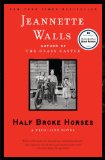Summary | Excerpt | Reading Guide | Reviews | Beyond the Book | Readalikes | Genres & Themes | Author Bio

A True-Life Novel
by Jeannette Walls
Mom didn't quite know what to make of me. She feared she might have trouble marrying me off because I didn't have the makings of a lady. I was a little bowlegged, for one thing. Mom said it was because I rode horses too much. Also, my front teeth jutted out, so she bought me a red silk fan to cover my mouth. Whenever I laughed or smiled too big, Mom would say, "Lily, dear, the fan."
Since Mom wasn't exactly the most useful person in the world, one lesson I learned at an early age was how to get things done, and this was a source of both amazement and concern for Mom, who considered my behavior unladylike but also counted on me. "I never knew a girl to have such gumption," she'd say. "But I'm not too sure that's a good thing."
The way Mom saw it, women should let menfolk do the work because it made them feel more manly. That notion made sense only if you had a strong man willing to step up and get things done, and between Dad's gimp, Buster's elaborate excuses, and Apache's tendency to disappear, it was often up to me to keep the place from falling apart. But even when everyone was pitching in, we never got out from under all the work. I loved that ranch, though sometimes it did seem that instead of us owning the place, the place owned us.
We'd heard about electricity and how some big cities back east were wired with so many glowing lightbulbs that it looked like daytime even after the sun had set. But those wires had yet to reach west Texas, so you had to do everything by hand, heating irons on the stove to press Mom's blouses, cooking cauldrons of lye and potash over the fire to make soap, working the pump, then toting clean water in to wash the dishes and dirty water out to pour on the vegetable garden.
We'd also heard about the indoor plumbing they were installing in fancy houses back east, but no one in west Texas had it, and most people, including Mom and Dad, thought the idea of an indoor bathroom was vile and disgusting. "Who in the Lord's name would want a crapper in the house?" Dad asked.
Since I grew up listening to Dad, I always understood him completely, and when I turned five, he had me start helping him train the horses. It took Dad six years to train a pair of carriage horses properly, and he had six teams going at all times, selling off one team a year, which was enough to make ends meet. A team had to be perfectly matched in size and color, with no irregularities, and if one horse had white socks, the other needed them as well.
Of the six pairs of horses we'd have, Dad let the yearlings and two-year-olds simply run free in the pasture. "First thing a horse needs to learn is to be a horse," he liked to say. I worked with the three-year-olds, teaching them ground manners and getting them to accept the bit, then helped Dad harness and unharness the three pairs of older horses. I'd drive each pair in a circle while Dad stood in the middle, using a whip to drill them, making sure they lifted their feet high, changed gaits in unison, and flexed their necks smartly.
Everyone who spent time around horses, Dad liked to say, needed to learn to think like a horse. He was always repeating that phrase: "Think like a horse." The key to that, he said, was understanding that horses were always afraid. The only way they could save themselves from mountain lions and wolves was to kick out and run, and they ran like the wind, racing one another, because it was the slowest horse in the herd that got taken down by the predator. They were all the time looking for a protector, and if you could convince a horse that you'd protect him, he would do anything for you.
Dad had a whole vocabulary of grunts, murmurs, clucks, tocks, and whistles that he used to speak with horses. It was like their own private language. He never flogged their backs, instead using the whip to make a small popping sound on either side of their ears, signaling them without ever hurting or frightening them.
Excerpted from Half Broke Horses by Jeannette Walls. Copyright © 2009 by Jeannette Walls. Excerpted by permission of Simon & Schuster. All rights reserved. No part of this excerpt may be reproduced or reprinted without permission in writing from the publisher.
Your guide toexceptional books
BookBrowse seeks out and recommends the best in contemporary fiction and nonfiction—books that not only engage and entertain but also deepen our understanding of ourselves and the world around us.